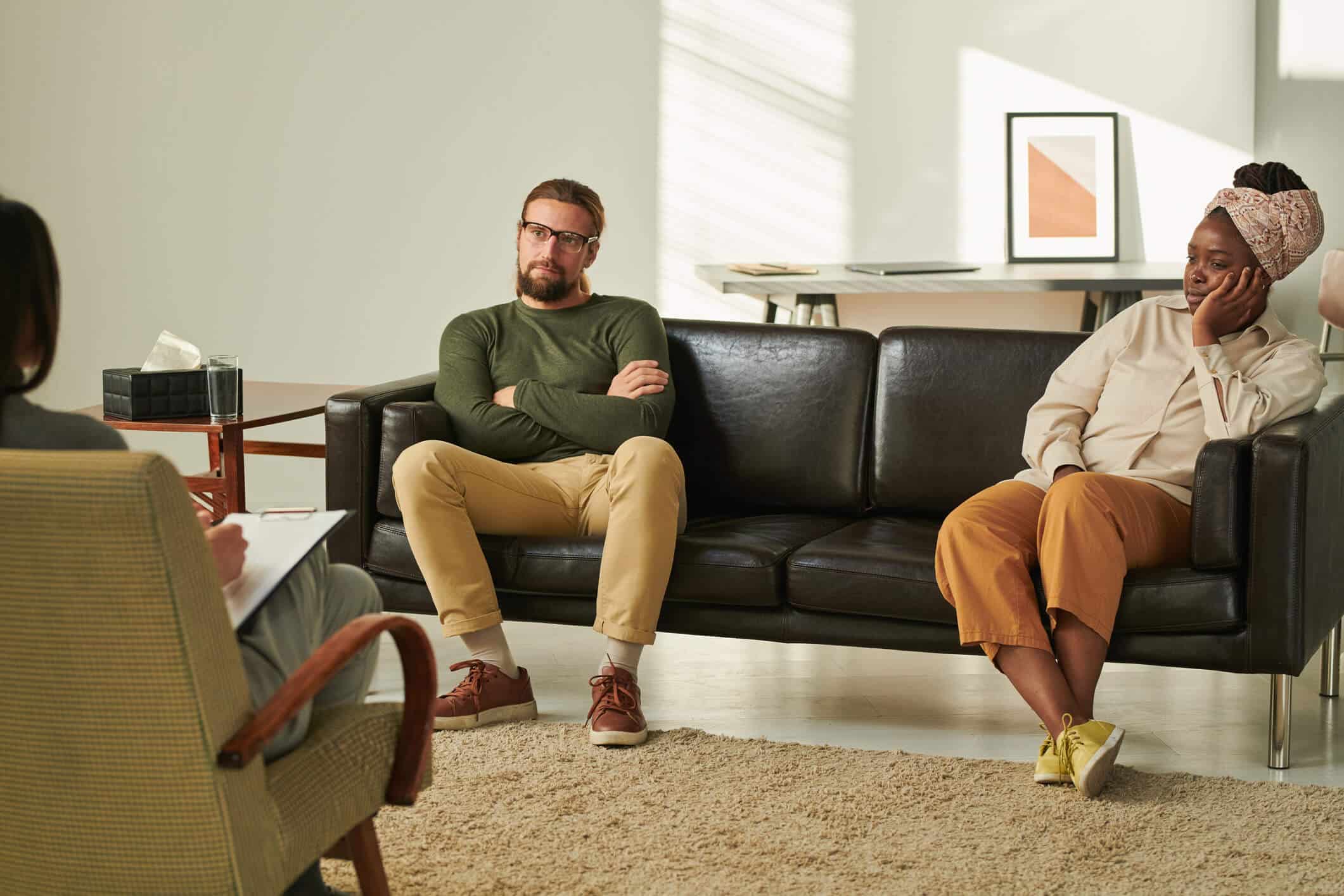As a therapist, you’re likely aware of the importance of addressing mental health issues and incorporating healthy coping skills to handle symptoms. As a highly treatable condition, anxiety can be greatly reduced with the help of talk therapy and other therapeutic approaches, among other treatment methods.
Claimed by the APA as the most common type of mental disorder, 30% of people experience some form of anxiety disorder at some point in their lives. If you’re experiencing anxiety that may be related to or caused by the stressors of your demanding profession, seeing an anxiety therapist could be beneficial.
A search for “highly recommended therapists for anxiety near me” may connect you with a therapist who specializes in anxiety disorders and other types of anxiety that do not necessarily fall into a clinical diagnosis. Whether you are looking for a therapist for yourself or someone else, a set of criteria for choosing a qualified anxiety therapist may help you find the right professional for your concerns and needs. Continue reading to learn more about anxiety disorders and how seeing a therapist who specializes in this area may help you improve your mental health.
Types Of Anxiety Disorders
If you feel you might be experiencing symptoms of anxiety that are affecting your mental health, it could be helpful to review the features of anxiety disorders. While worry and fear are normal emotions, anxiety disorders cause distress that may often be disproportionate to the situation. Anxiety disorders can elicit the flight-or-fight response and these feelings can persist and, in some cases, even worsen over time.
Anxiety therapists address many forms of anxiety disorders, including generalized anxiety disorder (GAD), phobia-specific disorders such as agoraphobia, social anxiety disorder, and panic disorder. Further included in the DSM-5 are other anxiety-related disorders, such as selective mutism, which typically applies to children, and separation anxiety disorder. While post-traumatic stress disorder (PTSD) shares some features of an anxiety condition, it is now classified in another category.
Symptoms Of An Anxiety Disorder
Depending on the type of anxiety you are experiencing, different symptoms may manifest. Their frequency and severity can vary from situation to situation and person to person.
Generalized anxiety disorder (GAD) symptoms may include:
- Excessive worry that gets in the way of daily life functioning
- Restlessness and/or fatigue
- Impaired concentration
- Sleep difficulties
- Muscle tension
Panic Disorder Symptoms:
The primary symptom of panic disorder is having recurring panic attacks and attendant psychological and physical symptoms. During a panic attack, experienced symptoms may include:
- Heart palpitations
- Sweating
- Shortness of breath
- Chills or hot flashes
- Nausea
- Pain in the abdomen
- A sense of detachment
- Fear of losing control

Phobia-Related Anxiety
A phobia is characterized as a persistent fear or aversion to a specific object, situation, or activity. Although individuals with phobias may be aware that their fear is unreasonable or excessive, their affect typically overwhelms their reasoning abilities to the point where they are unable to dismiss it.
Agoraphobia, for example, is an excessive fear of situations where one could get trapped or where it may be embarrassing or difficult to try to escape. Common symptoms of agoraphobia include a fear of being in crowds, fearing open spaces, being scared of getting stuck in a bus or other type of public transportation, or feeling apprehensive about leaving the house without a companion.
To prevent the feared situation from occurring, the person may actively try to avoid exposure, even choosing to stay home altogether in some cases.
Social Anxiety Disorder
Social anxiety disorder is characterized by an intense fear of being humiliated, shamed, ridiculed, or looked down upon in social settings or interactions. When avoidance of the dreaded situations is not possible, those who are affected by this disorder may endure uncomfortable situations with great trepidation. Specific fears related to social anxiety may revolve around public speaking, eating or drinking in public, and meeting new people, among others.
Separation Anxiety Disorder
Someone with separation anxiety disorder may display fear or anxiousness around the possibility of losing or being separated from a person to whom they are attached. Symptoms might include persistent nightmares about losing the person or resistance to sleeping without the person, for example.
Symptoms of separation anxiety disorder often begin in childhood but can continue into adulthood.
Selective Mutism
Selective mutism is characterized by an inability to speak—a freeze reaction—in certain situations, sparking a sense of anxiety and panic. While selective mutism typically begins in childhood, its symptoms may also be present in adulthood when the person is experiencing high levels of stress or anxiety.
Types Of Therapy For Anxiety
Currently, the main type of therapy employed to address anxiety disorders is cognitive behavioral therapy or CBT. As an evidence-based approach to psychotherapy, CBT aims to change limiting negative thoughts and behaviors into more helpful ones. At the same time, individuals can learn coping skills to alleviate symptoms of anxiety when they arise.
In a recent, naturalistic study spanning multiple states and primary care practices, participants with moderate to severe anxiety saw a significant decrease in their anxiety and depression symptoms during the course of a CBT intervention.
In conjunction with CBT, motivational interviewing (MI) has also shown therapeutic benefits for addressing symptoms of anxiety. Since this form of therapy relies less on having patients expose themselves to feared activities and situations, it is commonly seen as a “therapeutic strategy that addresses ambivalence about change.”
Acceptance and commitment therapy (ACT) integrates mindfulness into its approach by encouraging individuals to accept reality and make a commitment to their well-being. It also invites the client to challenge the distressing feelings that may be self-limiting.
Biofeedback focuses on the mind-body connection by teaching individuals how to control their physiological symptoms and reactions to stress. It employs relaxation techniques, like deep breathing, to help regulate one’s bodily functions, such as breathing patterns and heart rate.
Dialectical behavior therapy (DBT) can be useful in addressing intense emotions that cause stress and anxiety. Using modules, it focuses on such elements as distress tolerance and emotional regulation.
Criteria For Choosing The Right Therapist
When looking for a therapist, be it a family therapist who uses CBT, or a psychotherapist who utilizes DBT, having a set of criteria can ensure that you find a provider that is right for you or the patient in question. When searching for a qualified therapist, consider the following tips:
- A qualified therapist will have a license to practice. Each state grants a license to professionals who have completed the requisite training. Most therapist specialties also require a minimum of a master’s degree.
- Inquire about specializations or further training. If you’re seeking an anxiety therapist, determine whether this is an area they have advanced training in.
- Ask about their experience working with your concerns and age group to gauge how you might relate to them.
- Determine how many years they have been practicing.
- Inquire about the cost of services including whether they accept your insurance or offer payment plans. You can also take this opportunity to bring up any other financial concerns.
- Contact the therapist to ask if they use evidence-based treatment for your concerns based on published research of controlled studies and scientific journals. If you are interested in a particular therapeutic approach, such as biofeedback or CBT, you might choose to ask about it specifically. You may also ask whether they use any other approaches, such as mindfulness, to alleviate symptoms of anxiety in a holistic manner.

Types Of Therapists
Most therapists have a field of specialization, such as family or couples therapy, have a master’s degree (at least), and a license to practice. These mental health professionals help clients address specific challenges that may affect their overall well-being and mental health.
Anxiety therapists using CBT, for example, may help address the unhelpful belief patterns that are causing the anxiety and alleviate symptoms by introducing coping skills. They may also help an individual cope with anxiousness that may arise in certain stressful situations. Said anxiousness does not necessarily need to be due to an anxiety disorder or other clinical diagnosis.
A psychologist can diagnose disorders, conduct research, and supervise interns in a clinical setting, and may be able to prescribe medication. They will typically have a PhD or a PsyD.
The ease of your search for a therapist can depend on your specific needs and preferences. Therapy is all about you, and it can be important to find a provider that you connect with, can trust, and who can help you through the unique struggles you’re facing.
How Online Therapy Can Alleviate Anxiety
The experience of stressful emotions can affect anyone. Mental health professionals may routinely encounter clients and situations that could cause anxiety. If you believe you are experiencing symptoms of anxiety, you might consider speaking to a therapist. For many therapists, however, going to sessions in person can present a challenge due to a demanding work schedule. If this is the case for you, you may want to consider online therapy.
The BetterHelp platform, for example, enables you to connect with an experienced, highly qualified therapist by video conference, phone call, or in-app messaging, making it convenient to get in touch with your provider. This ease of communication may also be beneficial after a challenging session with one of your own clients.
The Efficacy Of Online Therapy For Anxiety
A recent, systematic review and meta-analysis that examined the efficacy of CBT delivered online versus in person found that “both internet-based and face-to-face CBT are equally effective in treating five different anxiety disorders. The meta-analysis showed that dropouts did not systematically favor one treatment format over the other.” Researchers suggested that one of the factors that may contribute to the efficacy and even superiority of online CBT for certain anxiety disorders is that it may aid in one’s ability to concentrate more fully on the session.
CBT is a therapeutic approach that focuses on the connection between a person’s thoughts, feelings, and behaviors. By adopting newer, more constructive ways of thinking and feeling, individuals can choose healthier, more productive behaviors.
Takeaway
Anxiety is one of the most common mental health conditions, affecting people from all backgrounds in various situations. With the help of a qualified therapist who meets your needs, criteria, and preferred treatment approach, your symptoms may be greatly reduced.
As a therapist, you may also need support in handling stress and anxiety while helping different clients. Considering therapy might be helpful regardless of whether you perceive an anxiety condition in yourself or not. To get connected with a therapist in a timely manner, you can sign up with BetterHelp and get started on a path toward improved mental health.



